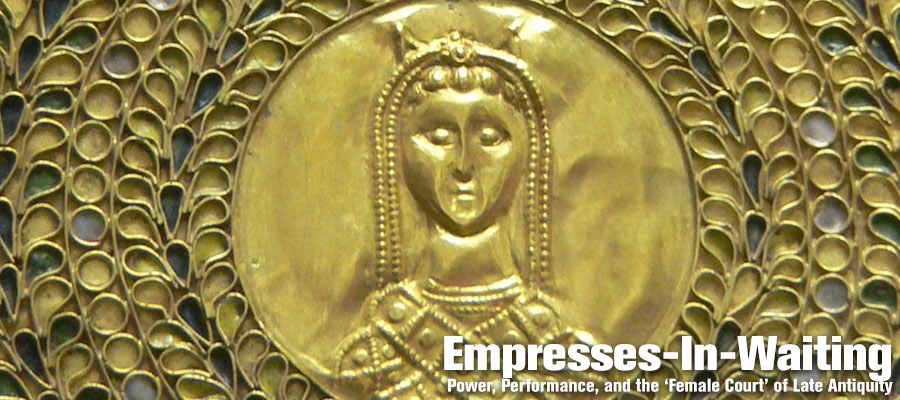Proposed edited volume: Empresses-In-Waiting: Power, Performance, and the ‘Female Court’ of Late Antiquity, submissions due February 28, 2021
Kenneth Holum’s 1982 "Theodosian Empresses" presented the female members of the Late Roman Empire as political agents in their own rights. It opened the way for a number of important recent studies that added to the foundations laid by Holum, including Liz Garland’s "Byzantine Empresses. Women and Power in Byzantium" (1999), Liz James’ "Empresses and Power in Early Byzantium" (2001), and, recently, Anja Busch’s "Die Frauen der theodosianischen Dynastie" (2015).
A common thread of these studies has been the prevailing focus on the exercise by imperial women of political and/or religious influence or authority. In a 2013 edited volume ("Matronage. Handlungsstrategien und soziale Netzwerke antiker Herrscherfrauen"), Christiane Kunst has applied the concept of “matronage” to ancient monarchies, meaning specifically female modes and means of expressing and manifesting status, influence, and power in the absence of legal authority. But this must be seen in the specific context of the monarchical court that these women inhabited; the imperial court of late antiquity was the centre of official and administrative live of the late Roman world, but it was also a hub of vast networks of patronage, the arena of fierce political competition, and the background to an extensive ceremonial that included the female members of the imperial family. The role of this court, its specific functions and functioning, has not yet received the attention it deserves; no systematic monographic study of it exists. This is even more true for the ‘female court’.
The fundamental assumption of this proposed publication is that this needs to be rectified, that, to truly understand the scope of imperial female agency in the late antique empire, a holistic approach to that subject is needed and one that firmly situates their potential influence and roles within imperial court society. In order to lay groundwork for future studies, the proposed edited volume will include original research on late antique empresses and their courtly contexts, dealing with a range of individual issues and questions, but always keeping an open eye for variations and transformations within late antiquity, understood to last from the early 4th to the late 7th c. We invite contributions on all aspects related to late antique empresses and imperial women, particularly those female family members that have been hitherto less studied, such as the women of the Constantinian dynasty beyond Helena, or imperial spouses such as Verina, Justina, Sophia, Ino Anastasia and Martina.
Chapters might address (but are not limited to) points such as:
- What was the role and position of imperial women within court society?
- Was there a ‘female court’ with its own officials?
- How did empresses and imperial women exercise authority or political power?
- What was at the basis (politically, dynastically, religiously, economically, culturally) of their influence?
- How did imperial women represent themselves and their power vis-à-vis individual populations or power groups?
- Did their public appearances and involvement in ceremonial differ from that of male
- members of the family? Did they adopt (or were given) different titles and, if so, why?
- How can we reconstruct biographies of imperial women that have been (wilfully or accidently) elided from the historical record?
Confirmed contributors include Marga Vallejo Girvés, Filippo Carlà-Uhink and Julia Hillner. Those interested in contributing are kindly requested to submit a short abstract (500 words maximum) in English, outlining subject and scope of the proposed chapter to both of the editors by 28 February 2021. Authors will be notified of acceptance by mid-March. We particularly encourage Early Career Researchers and PhD candidates to submit proposals.
Once the final selection of chapters is complete, the editors will submit a book proposal for the new monograph series “Women in Ancient Cultures”, published by Liverpool University Press, in spring. First drafts of the chapters (no more than 8,000 words, including bibliography) will be expected by late 2021. Inquiries can be directed at any time to either of the editors.
Editors
Dr. Christian Rollinger, Department of History, University of Trier (email)
Dr. Nadine Viermann, DAI Istanbul (email)
